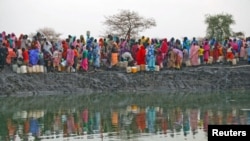Two days of clashes along the disputed border separating Sudan and the newly independent Republic of South Sudan underscore the tensions that continue to roil relations between the two nations. The United States is greatly alarmed by the renewed fighting along the undemarcated border, a flash point that could become even more dangerous and escalate out of control given the continued rise in tensions between the two states.
Both countries accuse the other of sending troops into their territory, and of also collaborating with rebel groups and irregular militia forces. The latest clashes are the most serious since South Sudan became independent last summer, an escalating wave of violence that has resulted in almost 140,000 new Sudanese and South Sudanese refugees since independence.
The split capped a six-year peace process that ended a long and bitter civil war, but the peace deal left a number of issues unresolved, including disputed border areas, the final political status of the Abyei region, and a comprehensive oil deal that would include transit fees the South should pay for use of Sudanese oil pipelines and ports.
Senior officials in both countries have said they won’t allow themselves to be dragged into war over their differences, but the continued attacks and counter-attacks threaten stability in the entire region. The U.S. calls upon all parties to cease all military activities along the border immediately, and strongly condemns all international humanitarian and human rights violations in the border region. Both nations must exercise the greatest restraint in this situation and ensure that all armed elements on the ground are contained. If the violence continues, it not only can affect stability, but also can make an already-dire humanitarian situation even worse.
Talks to improve relations between the two states were scheduled between Sudanese President Omar Hassan al-Bashir and South Sudan’s president, Salva Kiir Mayardit, on April 3, but the Sudanese have moved to suspend them following the intensified military campaigns. We urge both sides to proceed with plans for a session of the Joint Political and Security Mechanism (JPSM), a bilateral mechanism for both states to peacefully discuss security issues, as well as the presidential summit.
We are pleased that despite the recent clashes, technical delegations from both sides have gathered in Addis Ababa to plan for the meeting of the JPSM. It is more critical than ever that Sudan and South Sudan continue partnering with the African Union, the UN and other key international stakeholders to resolve ongoing differences. Only through direct contact and negotiations over fundamental issues of security and borders can the parties avoid further bloodshed, achieve vitally needed economic cooperation and coexist in peace.
Sudan Border Strife A Dangerous Flashpoint

Two days of clashes along the disputed border separating Sudan and the newly independent Republic of South Sudan underscore the tensions that continue to roil relations between the two nations.

















